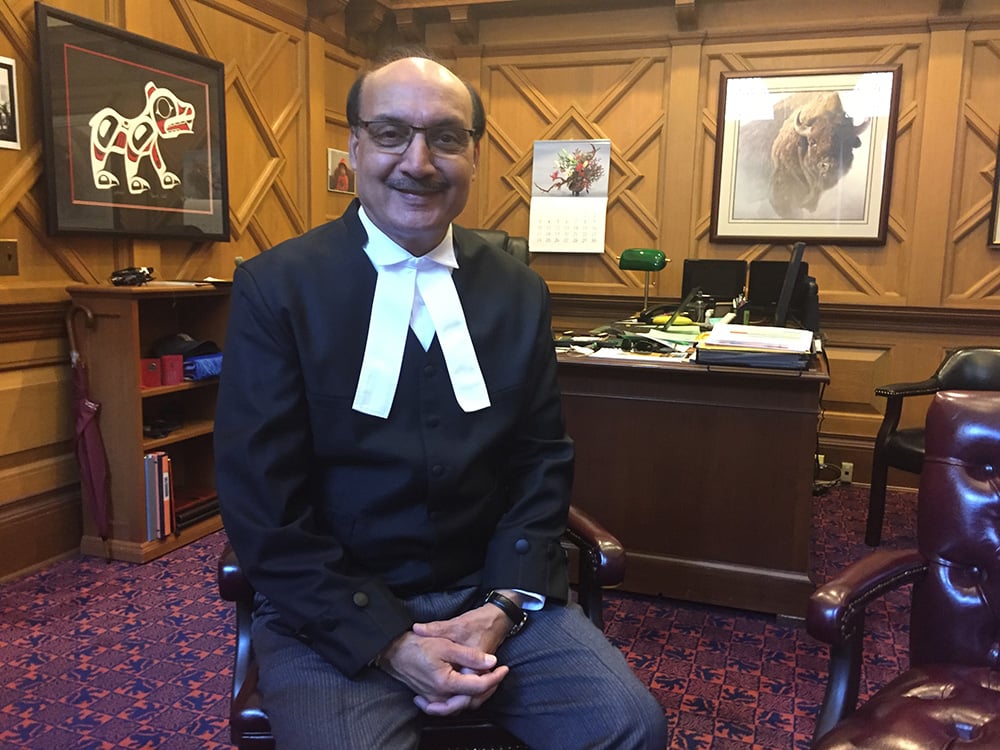Update, Oct. 16, 2017: Chouhan says the union cancelled the visit at the last minute due to a scheduling conflict. He has plans to rebook.
With the British Columbia legislature taking a Thanksgiving break this week, deputy speaker Raj Chouhan is travelling to California where he’ll meet with union leaders working to organize poultry farms.
Before entering provincial politics, the NDP MLA was the founding president of the Canadian Farmworkers’ Union and worked closely with Cesar Chavez and the United Farm Workers Chavez headed in the U.S.
Chavez, who died in 1993, was an iconic labour leader who has been recognized with a presidential medal of freedom, countless murals and a postage stamp.
“I’m still actively in touch with farm workers, either here or in California, helping them any which way I could,” said Chouhan, who was first elected to the B.C. legislature in 2005. “They have seen me in the past when I was working closely with Cesar Chavez, when he came over many times and stayed with me, helped me, mentored me [on] how to organize farm workers.”
The mentoring goes both ways. About a month ago the UFW invited Chouhan to visit Fresno to provide advice on a drive to unionize workers at poultry farms, since the Canadian Farmworkers’ Union had success reaching similar workers in B.C. who lacked protection, he said. (Chouhan, MLA for Burnaby-Edmonds, stressed he is making the trip on his own time with no expense to the B.C. government.)
“What we did in the ‘80s, instead of going at the farm gate or going into farms and talking to people, because we had no right to do it basically, we would find out maybe one farm worker or two who were willing to talk to us and we would then organize what we used to call kitchen meetings,” he said.
“[We would] ask them to invite their friends at their house rather than have a public meeting, because there is so much intimidation, backlash from their employers. That helped us a lot. That tactic worked very well to reach out to people.
“The second thing we did depended on their cultural background. If somebody belongs to a certain ethnic community and they go to a certain kind of church, or temple, we would then engage people at that level, going out and talking to them one at a time. It took us a lot of time. It was very time consuming, but it worked.”
The Californians are generally more experienced at organizing farm workers, but Chouhan said his B.C. experiences may be useful to them now. “Certain cultural sensitivities are still around,” he said. “There is one huge poultry farm, which I think employs over 2,000 people, so they have people from the Mexican background and also South Asians. It’s a mix.”
The UFW has been trying to organize the farm for several months, with little success so far, he said.
The union is making the effort at a time when it has become much harder to organize workers in the U.S,, he said. Organizers have made gains recently, but it’s tough, especially with greater intimidation under the Trump administration, he said. It’s major change from a few decades ago.
“In the ‘70s and ‘80s a huge number of farm workers in California and Idaho were organized,” Chouhan said. “But then the government changed in California, the laws were changed, they lost a huge membership to decertifications.”
A similar story has played out in Canada, he said. “In British Columbia, for example, we made huge gains in the ‘90s when the NDP was in power. We brought changes to the Employment Standards Act, the Workers Compensation Act and also the Labour Code.”
For a time there were greater rules and efforts to protect workers, such as random checks of farm vehicles and equipment, Chouhan said. “When the Liberals came to power in 2001, they basically turned the clock back. A lot of the gains made in that time were lost, so we’re hoping to do something more now.”
In particular the B.C. government formed in July is hoping to improve the conditions for temporary foreign workers, he said.
On the visit to California Chouhan said he expects to share stories, experiences and optimism that things can get better. “I’m just going there to say ‘you are not alone.’” ![]()
Read more: Rights + Justice, Labour + Industry, BC Politics
















Tyee Commenting Guidelines
Comments that violate guidelines risk being deleted, and violations may result in a temporary or permanent user ban. Maintain the spirit of good conversation to stay in the discussion.
*Please note The Tyee is not a forum for spreading misinformation about COVID-19, denying its existence or minimizing its risk to public health.
Do:
Do not: